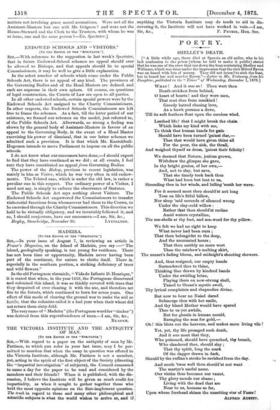ENDOWED SCHOOLS AND "VISITORS."
[TO THE EDITOR OF THE "SPECTATOR.")
SIR,—With reference to the suggestion in last week's Spectator, that in future Endowed-School schemes no appeal should ever be allowed to Bishops, and that appeals should lie to special Commissioners, it may be well to give a little explanation.
In the select number of schools which come under the Public Schools Act, there is no appeal of any kind. The provinces of the Governing Bodies and of the Head Masters are defined, and each are supreme in their own sphere. Of course, on questions of legal construction, the Courts of Law are open to all parties.
In all other endowed schools, certain special powers were by the Endowed Schools Act assigned to the Charity Commissioners. In other respects, the Endowed Schools Commissioners are left free to frame the schemes. As a fact, till the latter period of our existence, we framed our schemes on the model, just referred to, of the Public Schools Act. Afterwards, so strong a feeling was shown by the general body of Assistant-Masters in favour of an appeal to the Governing Body, in the event of a Head Master exercising his power of dismissal, that in our latter schemes we admitted such a provision. It is that which Mr. Knatchbull- Hugessen intends to move Parliament to impose on all the public schools.
I do not know what our successors have done,—I should expect to find that they have continued as we did ; at all events, I feel sure they have constituted no appeal from Governing Bodies.
The power of the Bishop, previous to recent legislation, was mainly in him as Visitor, which he was very often in old endow- ments. The Felsted case, which is under the old law, is rather a peculiar one in this respect. The ordinary power of a Visitor, I need not say, is simply to enforce the observance of Statutes.
The Public Schools Act says nothing about Visitors. The Endowed Schools Act empowered the Commissioners to transfer visitatorial functions from whomsoever had them to the Crown, to be exercised through the Charity Commissioners. This direction we hold to be virtually obligatory, and we invariably followed it, and so, I should conjecture, have our successors.—I am, Sir, &c., Bayley, Stourbridge, November 30. LYITELTON.






































 Previous page
Previous page